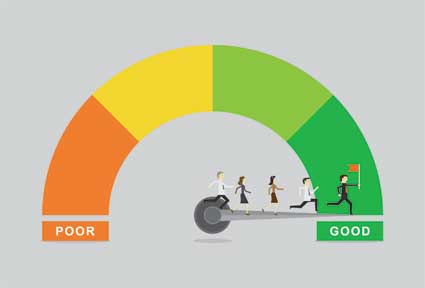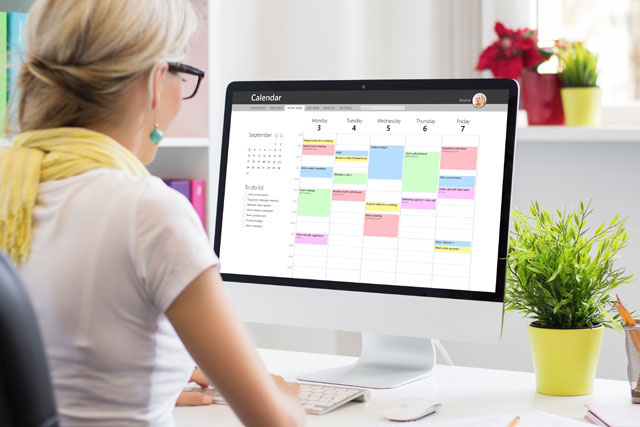Are you one of those people that always know exactly where your keys are -- every time?
Do you have a meticulous planner and calendar, so orderly that you never miss an appointment (or double-book your schedule?)
When it comes time to throw a party or host an event, do all of your friends and relatives turn to you for help?
Do you still have every single receipt for every single purchase you've made in the last year?
Is your checkbook perfectly balanced, and are your tax files completely in order?
Are your file cabinets uncluttered and your desk space clear?
So, you're thinking about becoming a professional organizer -- but what exactly is one? Essentially, a professional organizer is someone who helps other people take control of their surroundings. They do it by designing systems and processes based on tried and true organizational principles. They also work to educate the public on various organizational solutions, as well as the resulting benefits they can expect. But there's more to it than that.
Here's just a small sampling of the various tasks professional organizers regularly perform:
- Residential organization
- Business organization
- Time management
- Paper management
- Clutter control
- Chronic disorganization repair
- Behavior modification
- Space planning
- Filing
- Coaching
- Wardrobe organization
- Closet system design
- Event planning
- Errand running
- Personal shopping
- Financial management
- Memorabilia/photo organization (like scrap-booking)
- Packing and moving
- Records management
- Various types of training and education
- Computer organization
- Designing and organizing kitchen spaces
- Public speaking and seminars
- Home office organization
Some professional organizers will decide to focus their practice on just one of these areas. Others will branch out and include several (maybe even all) of them in their services.
Yet other organizers will focus their services on specific targeted audiences, like seniors, students, children, legal or medical offices, or maybe even people who suffer from Attention Deficit Disorder (ADD).
Some organizers don't even spend the majority of their time organizing. Instead, they offer products like books, CDs and software, or seminars and workshops on the local, national, and/or international levels.
Who Will You Be Working With?
As a professional organizer, you can choose to work with whomever you want to work with. If you'd rather work with younger children to help them get their rooms, lockers, desks, or study areas neat and organized, you can. If you'd prefer working with senior citizens, and help them devise organizational systems that simplify their lives, then so be it.
There are any number of people out there who could benefit from a little intervention from their local neighborhood professional organizer. People like:
- Homemakers. Whether they simply need someone to help them organize their kitchens so meal times don't look like something out of the local zoo, or they're looking for someone to design a hobby/work station so they can earn a little extra spending money, you want to be the person they call when the time comes for their own special pet project.
- Local Handymen (and women). What garage or shed couldn't use a little help when it comes to organization? There are tools to sort and separate, clutter to throw away, and unfinished projects to uncover. Whether you're simply there to help them create a system, or there to actually put the system in place, you can leave knowing you helped someone else get the job done.
- Teachers. Not only do teachers dedicate a great deal of their lives to the education and enrichment of children, they also have lives outside of the classroom to manage. Often, teachers could use a little extra help in the organizational department. Whether they're in need of a new system for grading papers, or efficient storage space for classroom arts and crafts supplies, with a little bit of luck, it'll be you they call in when help is needed!
- Students. Teachers aren't the only ones who can use some extra help. Students are just as in need. Whether in first grade or their first year of college, many students could benefit from a little extra organization around the classroom and the home study area. In addition to helping students manage their work spaces, as a professional organizer you're also likely be called in to help them manage their time a bit better. If some of the kids you know are having trouble getting their homework finished due to after-school activities, television, and their super-busy social lives, you might have the perfect solution to keep them punctual, prepared, and popular!
- Managers. While it's important for managers to have a neat desk, a legible filing system, and an organized schedule, far too often they simply don't have the time to tackle these chores themselves. So in between hiring, firing, training, and managing their employees, they need your help to juggle those more mundane tasks. If you can help improve their bottom line, they'll be more than happy to help you improve yours!
Where Will You Be Working?
Again, there are no set answers to this question. It really just depends upon your own personal preference and your local zoning laws. Some professional organizers prefer to work out of their own home offices. Others rent or lease office space downtown. Still others choose to do the majority of their work on-site, driving to the homes and offices of their clients to get the job done.
Each of these options has its own drawbacks and benefits. Working out of your home office is great if you live in an area where zoning laws allow you to have clients visit you at home, but far too many people don't have this as an option. Plus, even if you do have this option, the rest of your family may not be too pleased to have clients coming in and out of your home at all hours of the day.
Renting office space comes with the obvious drawback of higher costs, but this is balanced out by what a private office space can do for your professional image. People tend to take a person more seriously when they have the office space to back up their claims of being a professional organizer.
However, probably the vast majority of professional organizers opt to work with their clients on-site. While it may mean more travel time and travel costs, it's often easier to accomplish a task when all of the components are right in front of you. It will also be a bit easier to define what your clients' main organizational strengths and weaknesses are after you're able to visit and inspect their own personal space.
What Can You Expect To Get Paid?
While there is no set salary across the board, most professional organizers can expect to earn anywhere from $35 to $100 per hour, with $35 being on the very low end of the scale and $100 more likely only in larger, more metropolitan areas. On average, the typical professional organizer can expect to make around $50 to $60 per hour and may work anywhere from 20 to 40+ hours each week.
When it comes time for you to set your hourly wage, you'll have to pay close attention to several factors that are different in every geographical area. You'll need to consider how much (if any) competition you have in the immediate vicinity (roughly in a 50 mile radius - or as far as you're willing to drive one way to visit a client). You'll also need to consider how much people in your area will be willing to pay you for your services. If you live in New York City, then charging $90 an hour may be a very competitive wage. However, that same wage in Adel, Georgia may mean you wind up starving to death!
Your wage will also depend a great deal on which method you choose in sharing your organizational skills with others. If you're working at a client's home or office, you may need to increase your wage accordingly to off-set increased gas costs and vehicular wear and tear. However, if you prefer to offer seminars and classes to potential clients, you can charge significantly more or less than your hourly wage, depending on the total number of clients you'll be working with in each session. For instance, if you're offering a class at your local community college on getting organized, and the school lets you keep 65 percent of your class enrollment costs, what you charge may wind up being much different than you would in a situation where you're renting a huge convention center with seating for thousands of individuals.
When it comes to setting out to become a professional organizer, nothing is definite. It all depends on you and where you live -- things otherwise known in the real world as "circumstances." And your overall success will depend on whether or not you've got the qualities and characteristics it takes to get the job done - despite the circumstances mounted against you.
Essential Characteristics of a Successful Professional Organizer
Obviously, if you're planning on being a professional organizer, you must already have established a system of personal organization that works. It doesn't make sense to set yourself up as the standard for organization and then to show up at a client's home in a car that needs washing, with empty soda bottles littering the floor, holes in your stockings, or your briefcase in a shambles. If you want your clients to trust you to organize their lives, you should start out by getting your own in order.
How often are you late to appointments? How often are you early? Have you ever double-booked an appointment? Have you ever completely forgotten about a prior engagement only to be reminded when it's already too late?
While there are some people out there who are expected to be "fashionably late," professional organizers aren't those people. If you're hoping to help other individuals make sense of their hectic lives and schedules, it goes without saying that you should have some level of control over your own. And while no one is asking you to show up 15 minutes early to every single appointment you have, you should never (without a very, very good reason) show up late.
But good time management skills are about more than just being on time to appointments. It also means that you make the best use of whatever time you have available to you. Have you mastered the art of execution -- of getting the things done you say you'll do? Or do you struggle with making more commitments than you could ever hope to accomplish, leaving you feeling miserable and defeated? More than just being on time, time management means you do what you say you'll do, when you say you'll do it. It means that when you're forced to wait in line (or in the waiting room for various doctor appointments), you've got something on hand to keep you busy -- to keep you from wasting time!
While not seemingly as essential to your practice as personal organization or time management, if you're unable to relate with your clients, you'll probably have a hard time keeping those clients. So, take the time and effort to invest in yourself to make sure that your people and communication skills are up to par.
A big part of becoming a successful professional organizer lies in your ability to be a good listener. But more than simply listening, you also have to have that uncanny knack to intuitively know and understand the things that your client isn't saying (which is often much harder.) At all times, you should be paying close and careful attention to the things your clients reveal about themselves, their families, their environment, and their problems. For these are the things that will enable you to create a system that integrates into their lives seamlessly and unobtrusively -- two things that can make the difference between a successful solution and just another failed attempt at organization.
The listening part is often easier than learning to intuitively hear the things that your clients purposefully aren't saying. If you're working with a client who's trying to organize her kitchen space and you know that she's married, but you haven't heard her mention her spouse or the rest of her family, you should intuitively begin to wonder why. If you're being hired to help someone get their finances in order, but you haven't heard them mention balancing the checkbook, or keeping an accurate account of the money they're spending, that should immediately send up a red flag.
While these are integral parts of your career as a professional organizer, fortunately, they're both aspects that you'll strengthen over time, and with a little bit focused practice and attention.
When it comes to creativity and problem-solving in the life of a professional organizer, these two skills work hand-in-hand. If you want to be able to help your clients take control of their lives AND you want them to come to rely on you as an integral part of their organization, you've got to be able to think outside of the box. You have to have, through your experience, the ability to make huge problems turn into a series of small obstacles that can easily be hurdled. You have to be able to look at common, mundane problems and come up with creative solutions that not only work, but work fantastically well!
You need to have an eye for detail and design. You have to be able to know instinctively what will work, what won't work, and what might work if you changed things around a little bit. You also have to know what's going to work, not only for your client, but also for the other people involved in your client's life and environment.
Essential Skill #6: Flexibility
Discussing the importance of creativity and problem-solving skills brings us to yet another essential skill -- one that is equally important to your success: flexibility. Essentially, flexibility means that you understand that there is no single solution that's going to work for everyone. This isn't a cookie-cutter world. We've all got unique needs, wants, and desires. Successful professional organizers acknowledge this fact and look for new and different ways to show that to their clients. It also means that even when you encounter two different individualswith the same exact problem, you don't immediately respond by solving their problems in exactly the same way. Different people have different tastes, and to be a successful organizer, you'll have to take this into account.
So don't be rigid -- learn to be flexible!
Everyone has heard that phrase, "The best defense is a good offense." And as much as this adage applies to the sporting world, it also applies to the typical life of a professional organizer.
Perhaps the biggest goal of becoming organized (whether you're at home, school, or in the office) is being able to have some element of control over life. It means not having to always respond to a situation, but also being able to influence a situation before it becomes a problem. It means getting started on that project long before the deadline starts looming. It means stopping to clean up a mess as soon as you make it, instead of long after it's settled into a stain.
By learning to become pro-active in your own life, you'll be able to identify (from personal experience) what areas your clients need to focus their attention on. You'll also assist them in learning to emulate this essential skill in their own lives - meaning you've just completed a job well done!
It doesn't matter how well you've got your life organized, what ingenious systems you've devised, or what major life problems you've been able to solve - if you can't somehow share this information with others, it's worthless to the rest of the world at large. But this can be one of the scariest, most challenging areas in a professional organizer's career!
Fortunately, this is another area where you've got room to grow. No one is born with everything they need to be a great teacher. Even teachers spend a large amount of time in school learning how to teach. With a little work and a little help in this area, you can learn to teach too! All you really need is a sincere desire to help others tame their everyday lives.
If you possess that quality, the rest will begin to fall into place as you gain experience and confidence in your own skills and abilities. Then you'll be well on your way to helping other people take control over their lives and environments, one client at a time.
It doesn't matter how well you organize, teach, schedule, or solve problems: Without commitment and dedication, just about any venture is doomed to failure. That's why they're so essential (not only to your practice as a professional organizer, but also in the lives of your clients.) Commitment and dedication are the glues that hold your efforts and solutions together.
But there's more to commitment and dedication than simple will-power or determination. They also require that you, as the organizer, are goal-oriented, motivated, and able to look at the big picture -- not just the current frame.
While one of the joys of being a professional organizer lies in the fact that you'll (generally) serve as your own boss, it certainly doesn't make you the boss of your clients. If you're planning to become a professional organizer simply so you can take control over someone else's life and force your solutions on them, you might be setting yourself up for failure.
People don't like being told they're wrong, while you're right. They don't want to feel like they are stupid, or that they have horrible taste. In order to do your job effectively, you need to be able to collaborate with your clients to come up with solutions that will not only work, but that they'll want to see keep working. This means asking for their input, ideas, feedback -- AND putting these ideas into practice whenever and wherever you can. Plus, people are often much more likely to put a system into effect when, and if, you're able to convince them (in some way) that it was their own idea.
So, now that we've identified 10 of the most essential characteristics and skills every successful professional organizer should have, how do you think you stand?
If you've identified some areas where you could use a little work, take the time out to determine which areas need the most work, and how you plan to remedy the situation.































